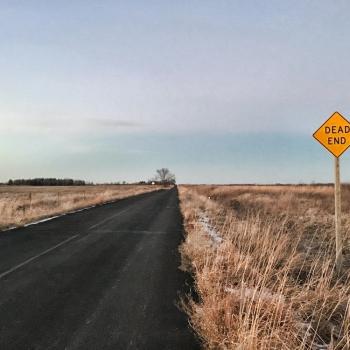
I’m tired to death of self-help, formulaic Christianity. For the last 25 years, I have sat through sermons and conferences, and read books and articles that imply a cause and effect relationship between Christian expectations and my personal happiness and fulfillment.
We’ve been force-fed Christian steps to better health, more successful businesses, stronger interpersonal relationships, and unlimited joy. And even though these steps never exactly deliver, we keep showing up to receive more.
But when I stop and think about John the Baptist, I realize that we’re making all of this nonsense up.
John’s auspicious origin story
When it comes to birth stories in the New Testament, John almost has Jesus beat. Sure, Jesus had the born of a virgin thing going for him, but his whole story happened pretty inconspicuously.
John’s birth, on the other hand, came with a big splash. His priestly father, Zacharias was visited during his temple service by an angel who announces that he and his elderly wife, Elizabeth, are going to have a child. The angel tells him that this child will be a predecessor for the Lord, and turn Israel’s heart back to God. When an ancient Zacharias shows a moment of skepticism about how this could even happen, he’s struck mute.
It turns out that Elizabeth does get pregnant. During her pregnancy, she’s visited by an expectant Mary. John’s fetus leaps in response to Jesus in Mary’s womb, and Elizabeth is filled with the Spirit—instantly recognizing that Mary is carrying the Messiah.
When it comes time to circumcise Elizabeth’s new son, the priest and family want to name him after his father. Elizabeth objects and, in keeping with the angel’s instructions, says that he will be called “John.” Of course, everyone argues with her because she’s just his mother, so what does she know? Zacharias requests a writing tablet and writes, “His name is John.” And immediately he can speak again.
Then Luke tells us:
All the neighbors were filled with awe, and throughout the hill country of Judea people were talking about all these things. Everyone who heard this wondered about it, asking, “What then is this child going to be?” For the Lord’s hand was with him.—Luke 1:65
Nothing like entering the world with the sky-high expectations of your entire community.
A prophet in the desert
The next time we hear from John, he has a ministry in the Judean wilderness.
In those days John the Baptist came, preaching in the wilderness of Judea and saying, “Repent, for the kingdom of heaven has come near.” This is he who was spoken of through the prophet Isaiah:
“A voice of one calling in the wilderness,
‘Prepare the way for the Lord,
make straight paths for him.’”—Matthew 3:1–3
 So where has he been all this time? We’re not really sure. It’s likely that his elderly parents died pretty early in his life. Many people believe John was put in the care of the Essenes, a group of desert-living Jewish mystics. We do know that he lived a very poor, ascetic lifestyle of eating bugs and wearing less-than-comfy camel hair blazers (Matt. 3:4).
So where has he been all this time? We’re not really sure. It’s likely that his elderly parents died pretty early in his life. Many people believe John was put in the care of the Essenes, a group of desert-living Jewish mystics. We do know that he lived a very poor, ascetic lifestyle of eating bugs and wearing less-than-comfy camel hair blazers (Matt. 3:4).
Did he grow up with the weight of prophetic expectation on him? Nearly everyone in Judea knew about his divine birth and the prophecies that surrounded him. Obviously, there had to be enough eyewitness testimony for Luke to be able to pull together John’s birth story.
It’s very likely that John grew up with the knowledge and weight of expectations that he was to do amazing things in preparation for God’s Messiah to be revealed.
That is probably why he adopted a severe lifestyle similar to the Old Testament prophets because, after all, that’s what is expected of those Ezekiel types. Apparently, people were curious enough to come out in droves to confess their sins to him and get baptized—a purifying practice popular with the Essenes (Matt. 3:5).
Jesus takes over
We’re told that Jewish leaders were pressing John to find out if he was the Messiah. John denies it. He was never in this for personal glory or fame.
Now this was John’s testimony when the Jewish leaders in Jerusalem sent priests and Levites to ask him who he was. He did not fail to confess, but confessed freely, “I am not the Messiah.” They asked him, “Then who are you? Are you Elijah?”He said, “I am not.”
“Are you the Prophet?” He answered, “No.”—Jn. 1:19–21
When John sees Jesus, he immediately identifies him. This identification shifts the focus off his ministry unto Jesus where it belongs.
The next day John saw Jesus coming toward him and said, “Look, the Lamb of God, who takes away the sin of the world!—Jn. 1:29
John baptizes Jesus (Matt. 3:13–17), and two of John’s disciples leave John to follow him.
It’s probably significant to note that John knows who Jesus is and addresses him as if he is the Messiah. He was probably instructed about Mary and her divine child during his childhood, even if the two children never had a chance to meet.
Whatever he’s been told, he recognizes that Jesus is greater than him and willingly gives his disciples up to Christ. He knows at this point that he has fulfilled his purpose of pointing people to the chosen one.
In John’s most famous quote, we’re given a hint into the true piety of his heart, “He (Jesus) must become greater;” he says, “I must become less (Jn. 3:30).”
Sadly, John has no idea how true this is.
John gets thrown in prison and begins to doubt
Always the outspoken prophet, John begins to criticize Herod publicly for his evil behavior—mostly because of Herod’s questionable new marriage.
But when John rebuked Herod the tetrarch because of his marriage to Herodias, his brother’s wife, and all the other evil things he had done, Herod added this to them all: He locked John up in prison.—Lk. 3:19–20
It’s important to know that, despite being imprisoned, John still has followers that are loyal to him. As he sits in Herod’s dungeon, he’s getting reports about Jesus’ activities. Just think about the information that’s coming in:
- Jesus is hanging out with tax-gatherers and prostitutes
- He’s talking to Samaritan women
- He’s healing gentiles
- He’s healing on the Sabbath
The reports he is getting back don’t sound anything like the Messiah he, or the rest of Israel is expecting. John lived out in the desert and denied himself. He sacrificed to serve God. The Messiah is supposed to be overthrowing Rome and returning the power to righteous Jews. Jesus just sounds like a self-indulgent troublemaker, not their chosen redeemer.
John’s whole life has been about holy self-denial, while Jesus is out there making wine for wedding parties.
Jesus will sum up this difference well:
For John came neither eating nor drinking, and they say, ‘He has a demon.’ The Son of Man came eating and drinking, and they say, ‘Here is a glutton and a drunkard, a friend of tax collectors and sinners.’ But wisdom is proved right by her deeds.”—Matt. 11:18–19
 In this comment, Jesus is pointing out how Israel finds fault with all her prophets, but another point comes shining through. Jesus is developing a terrible reputation because of the people he’s hanging out with—a reputation that’s been making it’s way back to John.
In this comment, Jesus is pointing out how Israel finds fault with all her prophets, but another point comes shining through. Jesus is developing a terrible reputation because of the people he’s hanging out with—a reputation that’s been making it’s way back to John.
John has to be starting to wonder if he’s made a huge mistake. Is he sitting in prison because he threw his support behind the wrong man? Wasn’t John always faithful? Didn’t he deserve better? Wasn’t he told his whole life that he’d be significant, and an important figure in the Messiah’s story? WHAT IS GOING ON!?
John confronts Jesus
When he’s had just about enough, he sends his followers to confront Jesus.
When John, who was in prison, heard about the deeds of the Messiah, he sent his disciples to ask him, “Are you the one who is to come, or should we expect someone else?”—Matt. 11:2–3
There’s no mistaking the accusation in this inquiry. Through his disciples, John is saying, “I have endorsed you as the Messiah, and you acknowledged that role. I’m sitting in prison trusting that I didn’t make a mistake. Are you who you said you are or not? Should Isreal be looking for someone else!?”
John deserves a forthright answer, but Jesus doesn’t exactly give him one.
Jesus answered and said to them, “Go and report to John what you hear and see: the blind receive sight and the lame walk, the lepers are cleansed and the deaf hear, the dead are raised up, and the poor have the gospel preached to them.”—Matt. 11:4–5
Pointing to the miraculous work that he’s doing and away from the gossip, Jesus is basically saying, “If you pay attention, you will see that I am.”
And then he says the most enigmatic, heartbreaking thing to John. He says:
“And blessed is he who does not take offense at Me.”—Matt. 11:6
“Despite all, you’re being told, and the fact that you’re sitting in prison. Don’t be offended at me. Don’t stumble in your faith on my account. I know you had expectations about how all of this was going play out, and I am sorry to tell you that—it’s nothing like you imagined. Trust me, and don’t let the offense of your dashed presumptions shipwreck you.”
Then Jesus looks at the crowd that’s gathered around them and tells them exactly what he thinks of John:
“Truly I tell you, among those born of women there has not risen anyone greater than John the Baptist . . .”—Matt. 11:11
John is beheaded
 After Jesus tells the crowd that John is the greatest man and prophet that’s ever been born, does he swoop in, guns blazing, and break John out of prison? No. He goes on with his business. Despite these glowing words about John, he presses on with his own agenda.
After Jesus tells the crowd that John is the greatest man and prophet that’s ever been born, does he swoop in, guns blazing, and break John out of prison? No. He goes on with his business. Despite these glowing words about John, he presses on with his own agenda.
Meanwhile, John continues to languish in jail, but it could be worse. So far Herod has protected him because he fears this man of God. He’s even enjoyed wandering down to talk to John on occasion (Mk. 6:20), but that’s all about to change.
During a particularly huge and wild party, Herod’s stepdaughter, Salome, dances for the guests. She does such an exceptional job that Herod drunkenly swears an oath to give her anything she asks—up to half his kingdom.
Salome confers with Herodias about what she should request. And, because Herodias has borne the brunt of John’s criticism, she tells her daughter to request John’s head on a platter—which Salome does. When he hears what his stepdaughter wants, Herod’s troubled. He doesn’t want to do it, but because he swore an oath in front of his dinner guests, he immediately sends executioners down to kill John. And just like that, with absolutely no warning, John is slain. This barbarity is compound with the indignity of John’s head being presented to Salome at a crowded dinner party.
Think about that for a second. John has done everything right . . . . Not only does God not deliver him from jail, but he also lets John be murdered to fulfill the wish of some teenage girl. It’s not just that the manner in which he dies is awful; the reason he dies is completely ridiculous. If anyone born of a woman deserved better, you’d think it would be John.
He spent the last months of his life mourning the death of his expectations and struggling with doubt. And then he’s ignominiously killed at the request of a teenager because of a personal vendetta? Is that what obedience gets you?
God doesn’t do quid pro quo
The most difficult part about this story is the way it spits in the face of cultural Christianity. We’re consistently spoon fed a Jeremiah-29:11 Christianity that promises that our goodness, self-discipline, and morality are exchanges that we make for blessings and comfort. We’re given 5 steps to a happy marriage and rules on growing our kids God’s way. And if our marriages fail or our children struggle, we’re left to wonder which formula we screwed up.
Despite the fact that we’re promised difficulties and hardship, we assume every terrible thing that’s happened to us is personal and intentional. We look in our dark experiences for the lessons that God’s obviously trying to teach us, as if we can turn that key and be released from whatever crappy situation we find ourselves in. Because bad stuff has to happen for a reason, right? Jesus’ friends should expect a lifetime of pizza parties and ice-cream socials.
But John wasn’t learning some valuable lesson in Herod’s prison. He didn’t have his head removed from his shoulders because of some secret sin or lapse in piety. In fact, despite the objections of my Calvinist friends, I don’t think John’s death played any major part in God’s righteous plan. It was the terrible fallout of a complex collection of free-will decisions in a horribly unjust world.
If you embrace a theology that assumes life’s struggles are for the people outside of God’s grace, you’ll only compound your suffering. Instead of enduring trouble with patience and stamina, you’ll writhe around trying to decipher the mystery of why you’re not being delivered. Is God to blame, or are you?
Does God intervene? Yes. Sometimes he does—but sometimes he doesn’t. The reasons are numerous, complicated, and unknown to us. It’s why Teresa of Ávila, the mystic writer once said of Jesus, “If this is how you treat your friends, no wonder you have so many enemies.” John probably felt the same way.
And Jesus’ response?
“Blessed is he who does not take offense at Me.”
















